| Srl | Item |
| 1 |
ID:
191086
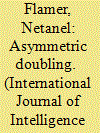

|
|
|
|
|
| Summary/Abstract |
As part of its intelligence warfare against Israel, Hamas made the identification and targeting of collaborators with Israel a top priority. During those years, the Hamas practice was to apply different degrees of detention and torture of those suspected of collaborating. However, in some cases, Hamas chose a different tactic of exploiting collaborators to transform a threat into an opportunity. Hamas turned some collaborators into double agents, using them to advance its objectives. This article examines some of the doubling operations carried out by Hamas on Israeli collaborators over the last three decades. Examining these cases reveal how Hamas’s doubling methods developed over time, concurrently with the movement’s evolution. Thus, the doubling operations became more organized and sophisticated, being used for propaganda and deterrence purposes as well as other goals. The article explores an interesting aspect of Hamas’s counterintelligence activity in its struggle against the state of Israel. In addition, it sheds light on how a nonstate organization can use doubling of sources as part of its asymmetric war against a state.
|
|
|
|
|
|
|
|
|
|
|
|
|
|
|
|
| 2 |
ID:
181223


|
|
|
|
|
| Summary/Abstract |
The architects of the Oslo process, at both the academic and intelligence levels, used the faulty ‘New Middle East’ paradigm to posit that the Palestinians were ripe for peacemaking. They ignored the considerable strength of the Islamists who, controlled by the Iranian regime, were deployed as peace spoilers. More than two decades after the collapse of the 2000 Camp David summit, the role of the Iranians has not been fully understood, leading most observers to assume that the Hamas and Palestinian Islamic Jihad are independent actors.
|
|
|
|
|
|
|
|
|
|
|
|
|
|
|
|
| 3 |
ID:
111619
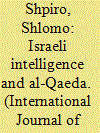

|
|
|
| 4 |
ID:
179137
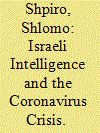

|
|
|
|
|
| Summary/Abstract |
The outbreak of the coronavirus crisis in Europe and the Middle East, in March 2020, caught the Israeli government and health authorities by surprise, unprepared for the scale and gravity of the incoming pandemic. In its efforts to provide fast and effective crisis management, and faced with a rapidly growing number of people infected with the coronavirus, the Israeli government turned to its Intelligence Community. Israel’s IC has a strong and long tradition as a key element within the structure of the state, and although ordinarily engaged in security and counterterrorism tasks, it was able to quickly adapt its considerable capacities to make a substantial contribution in the fight against the coronavirus.
|
|
|
|
|
|
|
|
|
|
|
|
|
|
|
|
| 5 |
ID:
116158
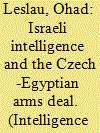

|
|
|
|
|
| Publication |
2012.
|
| Summary/Abstract |
This article uses records, recently made available, to shed new light on the way Israeli intelligence evaluated and interpreted the political and military implications of the Czech-Egyptian arms deal (1955). The evidence suggests that the intelligence services did not have the capabilities to cope with such an event. For the first two months following public exposure of the deal, intelligence was not able to present a coherent and evidence-based description regarding the extent of the deal and its implications. Subsequently, their assessment of the deal's implications evolved from gloomy and anxious to calm and reassuring. Causes of the intelligence service's difficulties in evaluating the situation's effects and the role of their assessment in shaping Israeli policy are discussed.
|
|
|
|
|
|
|
|
|
|
|
|
|
|
|
|
| 6 |
ID:
191885
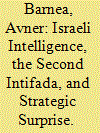

|
|
|
|
|
| Summary/Abstract |
The challenge of this article is on deciding the two-decade-old controversy among Israeli intelligence scholars and practitioners over what caused the outbreak of the Palestinian uprising in October 2000. The question remains: Was it preplanned by the Palestinian Authority or a spontaneous response to the violence that ensued following the visit to the Temple Mount by Israeli opposition leader Sharon, which was seriously escalated by Israel’s excessive military response? Drawing on a theoretical framework of two types of strategic surprises, the article clarifies the controversy and explains the outbreak of what became a long and bloody Israeli–Palestinian confrontation.
|
|
|
|
|
|
|
|
|
|
|
|
|
|
|
|